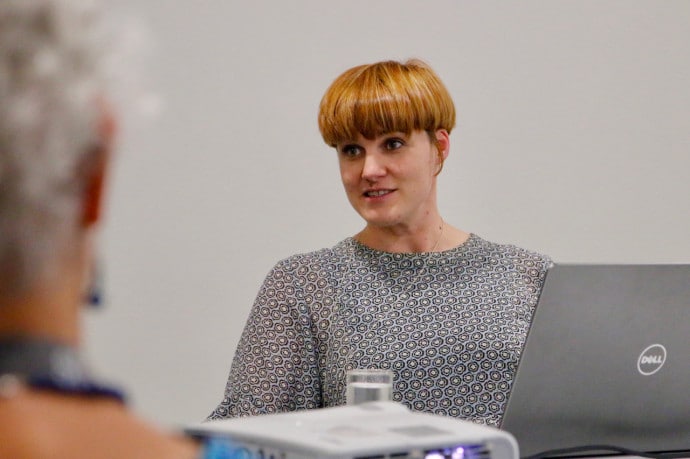“I want to understand why young people are struggling in the education setting. From my personal interactions with them, many express a feeling they don’t belong or cannot be their true selves. It’s hugely concerning that young people in elite spaces grapple with a negative sense of self. I’m hoping we can put in place interventions to change this.”
“Social group stratification and inequality remain deeply entrenched in South African society; nowhere is this more evident than in the education system. Recent social movements within this sector articulate not only economic injustice, but also the injustices of disrespect and misrecognition,” said STIAS fellowDebra Shepherd of the Department of Economics at Stellenbosch University.
Shepherd believes that while the economic inequality aspects of the South African education system have received attention, the influence and role of cultural and ‘identity’ capital has been neglected.
“I’m interested in fully exploring all the types and antecedents of inequality.”
She pointed to the dual-economy education system in South Africa where the split is roughly 70/30% between no-fee and fee-paying schools. “In the wealthiest subset of schools, 45% of grade 12 learners will achieve a school-leaving pass and immediately go on to undergraduate studies. Of these, 77% will go to university versus less than 10% from quintile 1 schools,” she said.
“We can’t deny the existence of schools with poor human and other resources, and bad management.”
“There is also no equal chance of self-selection for access,” she added. “It’s not only economic but also social injustice.”
But Shepherd believes this is not the whole story.

Stereotyping social identities
“The stigmatisation of social identities and prejudice are important factors reinforcing group-based inequality in academic access and performance,” she continued. “Stigma poses an ‘identity threat’ to individuals, producing stress responses and, thereby, poorer academic performance.”
“In South Africa, she continued, “entrenched stratification and stigmatisation of social identity is a direct result of the history of segregation.”
“Stigma is applied by virtue of a perceived social identity.”
Shepherd explained that individuals comprise multiple identities which interact and can become embedded in each other. Social identity is divided into categorical and relational identities. “Whilst relational social identities derive from interpersonal relationships, categorical identities (such as race and gender) are socially constructed. Even personal identities are not entirely self-constructed, but are constructed in historically transmitted social settings and can suffer stigmatisation.”
“Stigmatisation needs to be understood in terms of intergroup dynamics and social (and economic) power hierarchies.”
Shepherd further explained that when social groups conflict in a social space this creates internal conflict. “You question the value of one of your identities.”
Individuals respond to such stereotype threats differently by either further embracing their devalued social identity, or distancing themselves from it. “Research has not yet fully examined whether this is beneficial for academic performance. On the one hand, distancing strategies could be beneficial, but, on the other, could cause feelings of lack of authenticity for individuals who sense that they are disavowing an aspect of their identity.”
“I think we underestimate the stereotype threat and need to understand how this impedes performance.”
“Stereotypes cannot be changed overnight but we need interventions to fight them. It’s difficult to detach from a negative social identity. You need tools to negotiate that conflict. We need to use our positive identity to buffer against the negative identity for subjective detachment modelled by self-esteem.
Drawing from the disciplines of philosophy, sociology and social psychology, Shepherd would like to build a theoretical framework that incorporates social and personal identity, self-evaluation and self-confidence. “We have to aim for the construction of personal identity as ‘agency’ to maintain personal integrity to a sense of self. Necessary capabilities for any reasoning agent are self-scrutiny, self-affirmation and self-acceptance.”
“The environment in South Africa has impacted on all the stages of identity formation,” she continued. “We need to understand how social and economic capital limit identity achievement.”
“The project will investigate the role of stereotype threat in explaining differences in schooling performance, taking into account differences in individual attachment to these social identities, as well as differences in stigma consciousness and perception of the permeability of social boundaries.”
The project will include an in-depth examination of 14-years of social attitudes data from South Africa. “The idea would be to utilise pooled cross-sectional studies of this data to enhance understanding of the national identity.”
Shepherd also hopes to undertake a survey of university students at Stellenbosch University with the aim of developing and testing some interventions. “Stellenbosch is an elite, former white university where the student body has undergone significant demographic transformation,” she added. “It’s an ideal site to unravel some of these issues in detail.”
“I found a personal need to make my economic and cultural worlds come together,” she added. “An economic discussion without a sociology discussion is not enough. It’s about bringing social and economic capital back into connection with internal capital.”
“It will take a long time to change the fabric of South African society,” she said. “But it would be good to do something at the level of higher education. Broad societal shifts are all about pushing against the social order even on a small scale.”
“Ultimately, the development and/or enhancement of adaptive strategies to buffer the self against stereotype threat should, together with the redistribution of economic capital, form part of policy in the fight against inequality.”
Michelle Galloway: Part-time media officer at STIAS
Photograph: Christoff Pauw
